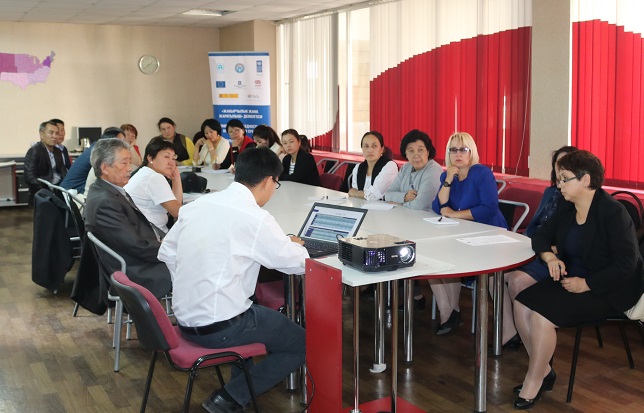News block
Ecosystem Services Valuation in terms of Science and Education
A seminar entitled “Increased capacity of key partners in ecosystem services assessment” was held at the Department “Sustainable Development of Environment and Life Safety” of the Kyrgyz Russian Slavonic University (KRSU) under the UNDP-UNEP Poverty-Environment Initiative.

Representatives of the Kyrgyz universities, science and the State Agency for Environmental Protection and Forestry under the Kyrgyz Government (SAEPF) attended the event.
The participants discussed the draft of the teaching and learning complex “Ecological and Economic Assessment of Protected Areas”. It consists of the similarly named textbook and study guide focused on assessment of ecological services. This complex is developed by a group of academics and methodologists of the Kyrgyz universities under supervision of the Department “Sustainable Development of Environment and Life Safety” of the Kyrgyz Russian Slavonic University. Importance of this teaching and learning complex is obvious today. Thus, Damira Sambayeva, the Head of the Department on Industrial Safety of the Institute of Mining and Mining Technologies by U.A. Asanaliev, says, “Each student should aware of environmental problems as issues of environmental safety are very important today.” Oroz Aidaraliev, the Head of the Department for Ecology and Environmental Protection of the Kyrgyz Agriculture University by K.I. Skryabin, believes all students have to have knowledge on ecological constituent in economic advancement.
“Economy greening is manifesting at a larger scale today. The President of Kyrgyzstan mentions the sustainable development as the unity of economic development and environmental safety. This becomes possible due to the education system in which was introduced the subject “Bases of Ecology” to all universities of the country. It includes issues on economic assessment and ecological and economic development,” says Elena Rodina, the Head of the Sustainable Development of Environment and Life Safety” of KRSU.
Participants discussed issues of the ecosystem services assessment through prism of science. Venera Surappaeva, the Head of the Department for Forest Monitoring and National Inventory under SAEPF, underlines the enormous role of science in advancement of ecology in economic development. “Science is our priority number one. We will get revised methodologies and recommendations for sustainable forest management basing on scientific researches. Based on scientific data we are developing the Forestry Development Concept for 2040,” she says.
In his turn, Muslim Razhpbaev, the Academic Secretary of the Forest Institute of the Kyrgyz National Academy of Science, believes the science is a course determining the sustainable development of any society. “Science has to provide a rationale for further development based on researches and data; and surely the science needs appropriate funding,” he says.
Reportedly, they will introduce the subject “Ecological and Economic Assessment of Protected Areas” in universities teaching environmental subjects from next semester. To date the universities’ Boards of Studies are considering the introduction of this subject as mandatory one in their curricula. In parallel, they are working with the Ministry of Education and Science of the Kyrgyz Republic to approve the educational and methodological complex “Ecological and Economic Assessment of Protected Areas”.